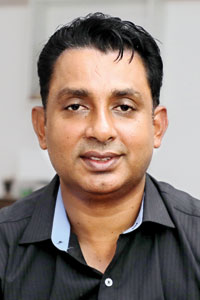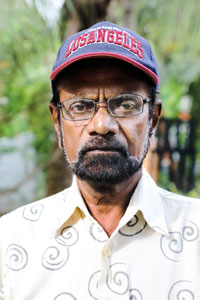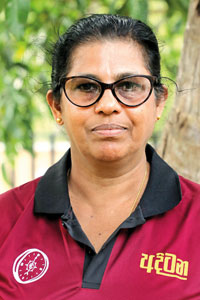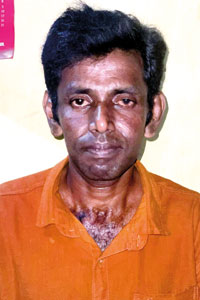News
In Anuradhapura district, rival supporters contest ‘we’re ahead’ claims
View(s):Anthony David reporting from Anuradhapura
On a sunny day in November 2019, Nandasena Gotabaya Rajapaksa was sworn in by Chief Justice Jayantha Jayasuriya at the sacred Ruwanweli Maha Seya here. It was built by King Dutugemunu, who, according to historical records, was a brave ruler and defeated King Elara at war.
In his first address to the nation, Rajapaksa spoke proudly about his achievement in 2009, the military defeat of the Liberation Tigers of Tamil Eelam (LTTE). Declaring that the “curse to the country for nearly 30 years” was now over, he said an “environment where people could live without fear or anxiety and “enjoy their human rights freely was created.” He took pride in the fact that people could travel freely to any part of the country. He praised “our war heroes and their families” and lauded the sacrifices they have made.

Rohana Bandara
His words ring true as one stands on the sacred soil around Ruwanweli Maha Seya. There is an atmosphere of a festival. Clad in white, thousands of devotees from many parts of the country traverse the sacred precincts built 2,500 years ago. The rich have come in their cars and the poor in buses with cooking utensils and firewood stacked on the roof. It will be more on Tuesday when the country marks the Binara Poya and the police say that numbers will swell. Even if one does not say so, the main reason is the absence of any fear of terrorism like landmines or bomb explosions. In fact, on that fateful day of May 14, 1985, Tiger cadres infiltrated the town area. They opened fire at travellers at the bus stand, killing or wounding many civilians.

Nihal Wijesooriya
Notwithstanding, there is a paradox. It is not only the Tiger cadres who are not seen or heard of in this sacred city and its larger environs anymore. Ironic enough, also not there is the governance of onetime President Gotabaya Rajapaksa. Almost three years after assuming office, he faced the worst civilian protests (aragalaya) and had to leave the country. Immediately thereafter, he sent in his resignation from Singapore. It took effect from July 14, 2022. During that period, tough security measures had to be enforced in this area. Protestors were targeting a female employee of the government hospital whose other occupation was working as an astrologer. She had advised then President Rajapaksa too and was among well-wishers who helped build a house for her. She had to be given police protection.
Once again, the departure of Gotabaya Rajapaksa is resonating in this area, like in other parts of the country. If Parliament voted for Ranil Wickremesinghe to serve the remaining part of Gotabaya’s tenure, the five-year period would end. Hence, presidential elections are being held on September 21.
The Anuradhapura district is agriculture-based like the adjoining Polonnaruwa district, both being the rice bowl of Sri Lanka. In recent years, it has also veered into growing vegetables and fruits. One could estimate the extent of land coming under them, looking at the roadside vendors. There are at least ten or more makeshift outlets selling produce. The district has a registered strength of 741,862 voters. It is to woo them that a select group of supporters of candidates are engaged. This district forms nearly 11 percent of the country’s land area.

Manori Ratnayake
Why select groups? In general, any visitor, particularly those from abroad, going into an area is struck by the lack of visibility of an election. Other than crowds at a meeting, there is no political activity. There are hardly any cutouts. Posters are banned by election laws. Only meetings or rallies could be publicised through posters. That too should bear the imprint of the person ordering such publication as well as the printer. Yet, there are small groups busy doing their bit for candidates they support.
Though there are 39 candidates, one is dead. His name nevertheless appears on the ballot paper. The frontrunners, one can safely conclude, are three: Anura Kumara Dissanayake, leader of the Janatha Vimukthi Peramuna (JVP)-led National People’s Power (NPP), Sajith Premadasa, leader of the Samagi Jana Balavegaya (SJB), and independent candidate Ranil Wickremesinghe, the leader of the United National Party (UNP).
One such person is Nihal Wijesooriya (73). He spent 18 months in prison for being allegedly involved in the 1971 abortive insurrection. He now works in the tourism sector. “People are sick of the bribery and corruption now prevalent among politicians. They are yearning for a change. This change can come about only through the NPP,” he told the Sunday Times. He conceded that some voters may still be apprehensive, taking into consideration the troubled past of the JVP in 1971 and 1987. However, he said, “We are educating the people that since 1994 we are in the democratic process.” The main issues here are the problems faced by farmers and the conflict between humans and elephants.
Manori Ratnayake said she is a voluntary supporter of the NPP. “We travel to the outlying villagers to educate voters on why they should back NPP leader Anura Kumara Dissanayake. “The main election is no doubt mounting bribery and corruption,” she said. A former member of the Anuradhapura Municipal Council, H.B. Shantha Herath, said that the NPP reached a major milestone in educating female voters on the issues. “The majority of voters are females and have elected successive governments. Since early this year, we have been educating them of various issues, the main among them being corruption,” he pointed out.

Saman Anura De Silva
Parliamentarian Rohana Bandara is confident of a Samagi Jana Balavegaya (SJB) victory in the district. “We are attracting large crowds not only at public rallies but also at pocket meetings,” he told the Sunday Times. This includes areas to which the SJB had little access because they were at one time considered the territory of the Sri Lanka Podujana Peramuna (SLPP). He strongly contested the claim that the NPP was well ahead of the SJB and claimed that Sajith Premadasa was ahead as he had “worked closely with the people.” He pointed out that “he even knows our grassroots-level leaders by their first names.”
Rohana Bandara, who is the SJB organiser for the Medawachchiya electorate, said, “Our grassroots-level branches have increased. More and more members are joining us.” Added Anuruddha Premasiri, an SJB campaigner, “Our campaign has extended from house to house.”
A stalwart of the Sri Lanka Podujana Peramuna (SLPP), S.M. Chandrasena, a leading figure in Anuradhapura, has switched allegiance to independent candidate Ranil Wickremesinghe. He noted that several rallies have been held in the district to canvass support for President Wickremesinghe’s candidacy. Yet, there has been no house-to-house campaign in support of him.
Mr. Chandrasena, though, insists that President Wickremesinghe “will definitely win Anuradhapura district and the presidency.” He claimed he did not see any momentum shift for the NPP or SJB.
He added that since Anuradhapura was an agricultural district, issues such as irrigation projects and providing fertilizer at lower cost were chief concerns for voters. These matters are already being addressed by the President, he remarked.
Mr. Chandrasena acknowledged that the SLPP had suffered a split owing to a decision by a majority to back Mr Wickremesinghe, but doubted that party’s candidate Namal Rajapaksa could obtain any significant voter support.
Saman Anura De Silva used to run a bookshop in Anuradhapura town, but his business went bankrupt during the economic crisis. He now sells lottery tickets.
Mr De Silva said he has been able to get back on his feet thanks to his new trade. He felt now is “not the time to experiment” as “it was by trying to experiment that we created a situation that led to fuel and gas queues.” He plans to vote for President Wickremesinghe as he believes the country will be better off if he is allowed to carry forward his programme over the next five years.
Whoever wins this key district has a lot to do both for the betterment of its inhabitants and to further protect some of Buddhism’s historic sites.
Polonnaruwa District
The Polonnaruwa district, with 351, 302 registered voters this time, has produced a President in the past in Maithripala Sirisena. Mr Sirisena has opted to remain neutral during the upcoming presidential poll. Another sitting MP, former Sports and Irrigation Minister Roshan Ranasinghe, has thrown his hat into the ring and is contesting this year’s presidential election as an independent candidate. Former MP Sidney Jayarathna too is contesting as an independent candidate.
Of the three other sitting MPs in the district, SLPP MP Jagath Samarawickrama is supporting President Wickremesinghe, SJB MP Kins Nelson is supporting Mr Premadasa while former State Minister of Highways Siripala Gamlath is supporting Mr Rajapaksa.
A peaceful atmosphere prevails in the district, with no major incidents of election violence, save for one complaint of an alleged assault. Other complaints relate to violations of election law.
A major complaint from farmers in the Polonnaruwa District, especially in the Mahaweli B and C Zones, is that they have not received a good price for their paddy. This has placed the government at a disadvantage.
The best way to say that you found the home of your dreams is by finding it on Hitad.lk. We have listings for apartments for sale or rent in Sri Lanka, no matter what locale you're looking for! Whether you live in Colombo, Galle, Kandy, Matara, Jaffna and more - we've got them all!

